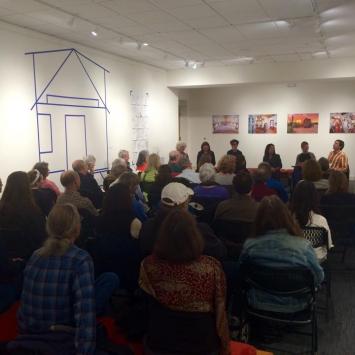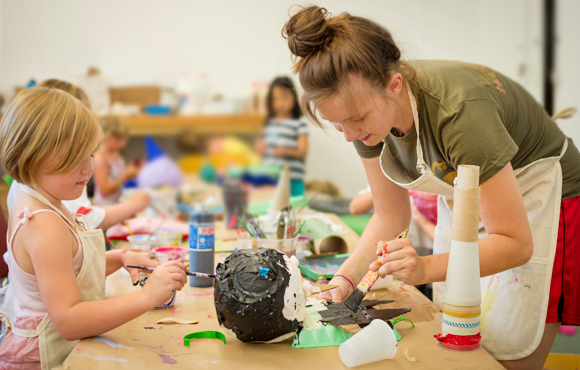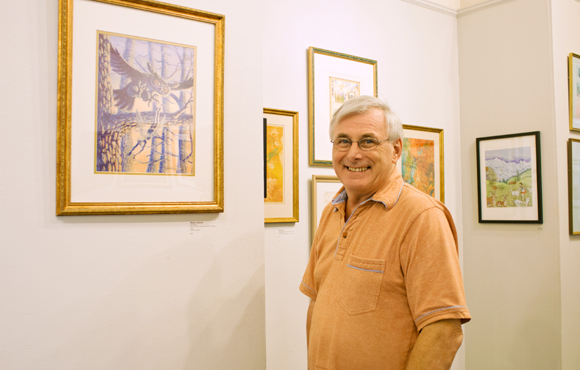ArtTalk Summary: Creativity and Education
October 16, 2015 by Miranda

Last night, forty five people found their way to The Umbrella Gallery for our second formal ArtTalk, a panel on Creativity and Education. Priscilla Sanville from Lesley University, Brenna McCormick from Emerson College, and Jennifer Hurley-Wales from From the Top sat on the panel, which was moderated by Michael Goodwin and Tracie Dunn from the Concord River Institute. At the last minute, Linda Nathan had a family emergency and could not make the event, but her seat was filled by Linda Gerstle from From the Top.
The first question Michael and Tracie posed to the panelists was based off a quote from Henry David Thoreau. “What does education often do? It makes a straight cut ditch out of a free meandering brook.” Each panelist was asked how this statement resonated with them given their own professional experience.
Brenna McCormick started by discussing the class on creativity that she teaches in the marketing program at Emerson College. Her students, many of whom go directly from high school to college to graduate school, spend the first half of the semester without grades and they absolutely hate it. She's found that after an educational career based on grades, her students are uncomfortable with ambiguity.
On a slightly different note, Jennifer recognized that as the co-founder and co-CEO of From the Top, she is a producer and her role is to make the ditch. Linda, the educational director at From the Top, went on to say that their kids are the gold standard for classical music and for many of them it's hard to step off the path. But she see recognizes that learning never happens in a straight line and views it as her job to help them see out of that path without giving the path up.
Drawing from her own similar experience, Tracie said that she grew up being praised for her ability to draw exactly what she saw. "I was such a strong draftsman that I could get on the path to college, but I missed the richness and roundness of art."
Michael rounded out the answer by discussing the importance of finding the sweet spot between structure and freedom. "How do we five enough structure to allow for meandering?" he asked. He used this is a jumping off point to discuss alternative forms of assessment, both in regards to the arts and more broadly. One of the questions he raised, which he found that no one ever asks, is: "What is the purpose of schooling?"
All of the panelists, and many of the audience members, chewed over this rarely asked question. Linda challenged use to ask what we are using as incentives for our kids saying that if the incentive is a rigid test, then that's how they're going to learn.
Brenna agreed, adding that "Grades remove students from the reality of being out in the world and discovering their own voice. They ask instead of forming opinions and when they do form opinions, they are based off of judgement rather than research."
At this point, audience member and resident artist Cynthia Katz who teaches photography to high school students, brought up the importance of giving kids the language to talk about what they're doing in a significant way. She described her role as helping students recognize the importance of art and creativity even if they aren't going to become professional artists.
This led into the next question Michael and Tracie posed to the panel, based off of a quote from Sir Ken Robinson: “Many people do not think of themselves as creative and lack the confidence to take even the first steps….attitudes important for creative learning include: high motivation and independence of judgment; a willingness to take risks….” The panelists were asked to reflect on what the first steps towards creativity look like and how do they help others build the confidence to take them. In addition, they were asked what conditions must be present in an educational environment to allow a learner to take creative risks.
Priscilla came up with a list of four conditions to facilitate creativity, acknowledging on the spot that they were coming to her as she spoke. First, she said, we have to acknowledge students identity, where they come from, and what they know already. Then we have to create a structured environment where people feel comfortable taking risks. Our third goal has to be to improve access across the board, acknowledging that class and money have a strong effect on access to creativity. Lastly, we have to ask who values creativity. Priscilla focused in on stories of teachers who have completely bought into the importance of teaching creativity, only to work in a system that doesn't acknowledge it's importance. She asked, how can we support teachers when the leaders of the system don't get it?
Brenna went on to say that creativity is complex and personal, that as teachers we have to understand where students are coming from when they say they aren't creative. She said that she always tells her students, "Creativity is a skill, not a magic talent," and that the number one trait of creative people is the perception that they are creative. What gets in the way? Many adults believe they are just too busy, which makes them lose their own permission to be creative.
Jennifer jumped on the concept of who feels permission to be creative asking, "Who has the confidence to take risks? Who feels free to create?" She called attention to the obsession with achievement in privileged communities and how arts get left behind because they aren't included on the achievement list.
From this, Michael brought up the importance of helping students develop a sense of purpose. He described a student writing to their local church, asking them to display a sign that they were passionate about. The student spent hours agonizing over every word choice, every comma, and while Michael watched he realized that this was how he should be teaching students to write. Not with essays, but by using real world issues that they cared about "It's not a question of capacity," he said. "It's a question of will." How do you get people to develop the will to change the school system? How do you develop a sense of purpose?"
Tracie focused in on the importance of vulnerability and letting students see teachers take a risk. She described freezing with stage fright at an event with students and recognizing that they were watching her as she worked through it. She felt that this interaction helped contribute to the authentic community of learners that she and Michael strive to create at the Concord River Institute. That being vulnerable and building trust in the community is the foundation necessary to promote risk taking.
Linda underscored the importance of building relationships around shared common experiences, to which Michael responded that it is important to remember that relationship building is not separate from content. This resonated with the audience and sparked some questions from attendees. They focused in on what the community can do to help promote creativity, how they can make a lasting difference when it feels like these same problems continue to arise.
After questions from the audience , Michael asked the panelists to think of a last remark that attendees could leave with.
Brenna started by asking us to abolish the word creativity, especially as it regards to only a specific group of people. Creativity, she said, is part of everyone and we need to stop perpetuating the message that it belongs to a specific few. Priscilla went next and asked the community to acknowledge that we all have different work to do, and to try to recognize what their work is.
Linda thought back to a student who turned to her during a trip with From the Top and exclaimed "They were actually interested in what I had to say!" She asked the attendees to express their interest and engage with the world around them. Jennifer built off of Linda's request, challenging the attendees to bring a child with them to events, to engage others in order to connect the community.
Finally, the two moderators took a moment and thought about what they had heard in the panel and what they experienced in their own work. Tracie asked us to make art really easy and to make it less precious, she spoke about encouraging group work with her students in order to help them break free from the preciousness of their work.
Michael left us with a piece of advice that he often gives to his students: "Never expect that anyone else will do anything about it."
As the talk wrapped to a close, attendees went up to speak to the panelists, explaining their own work within the realm of creativity and education. Here at The Umbrella, we hope that this is just one step in a much larger conversation about the importance of supporting and acknowledging creativity as a vital part of education.
---
Want to be part of the conversation? Join The Umbrella for our upcoming ArtTalks:
- Behind the Graphic Novel on Saturday, October 31 at 1:00 with bestselling author, Marika McCoola.
- Not Your Grandmother's Fine China on Thursday November 12 at 6:00 with artist Jessica Putnam Phillips, whose work is currently on view in BIG Art; Tiny House.







